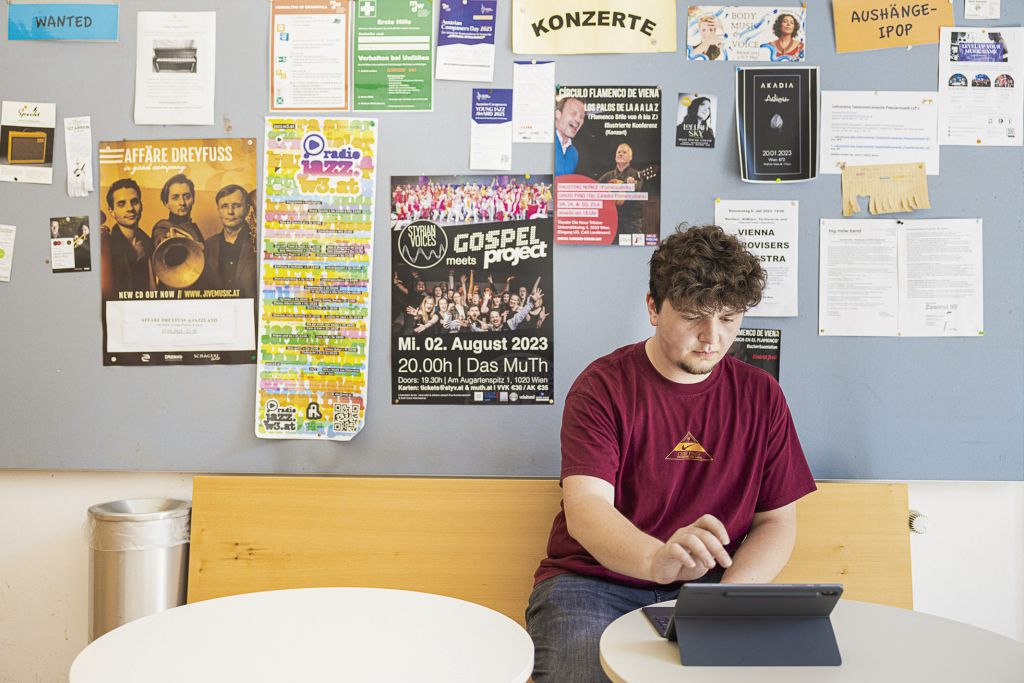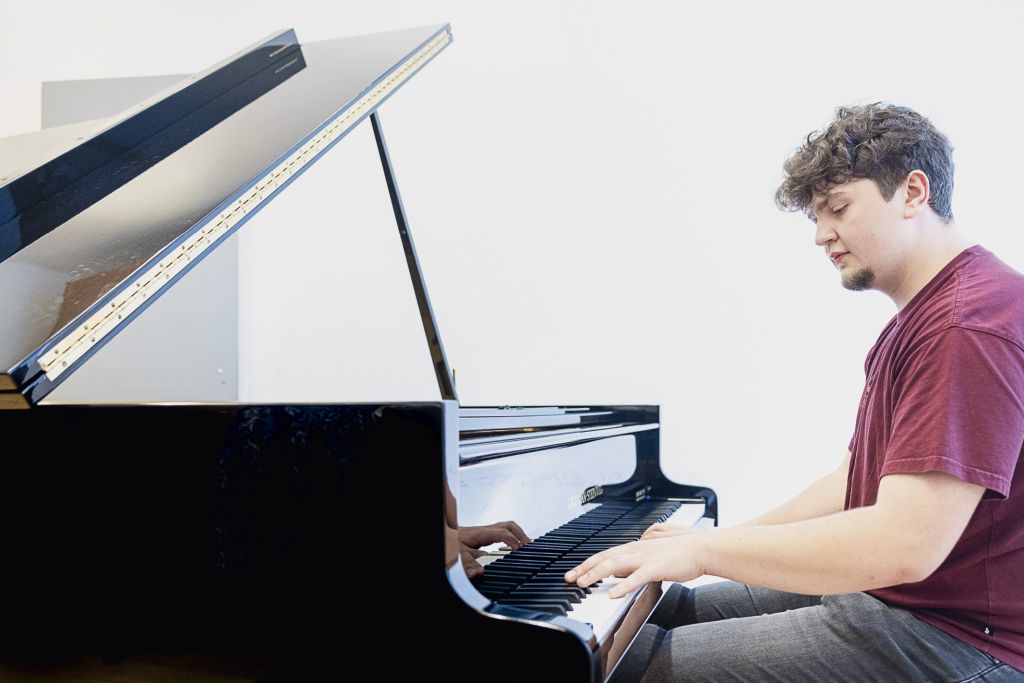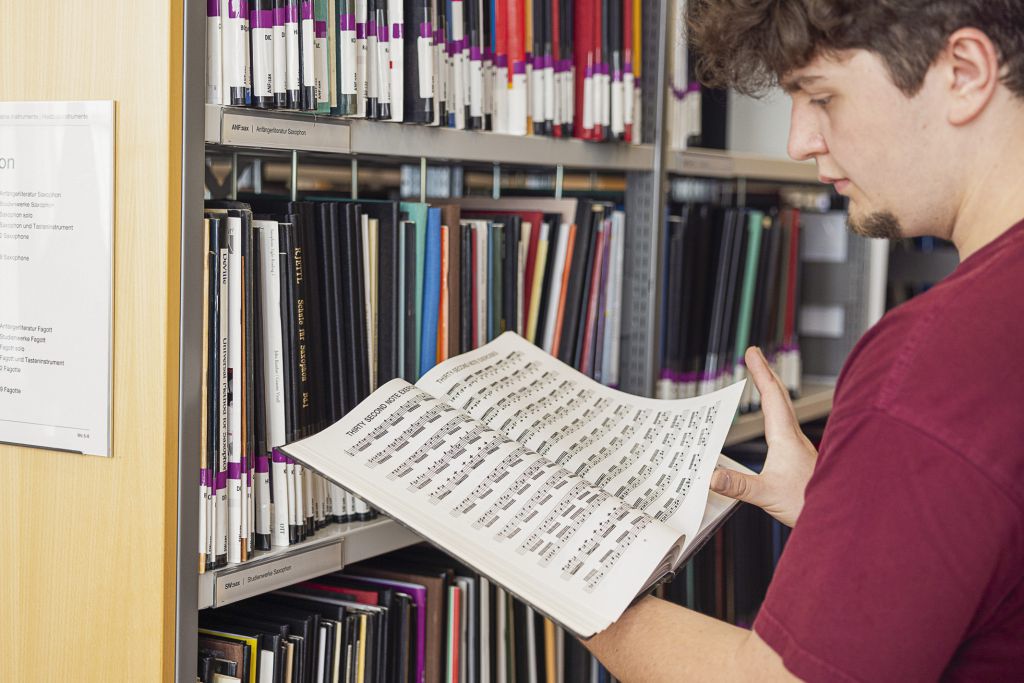The Path Toward Studying Music Education
Norbert Polek has been majoring in Keyboard Instruments for Popular Music in the mdw’s Music Education (ME) programme for a year now. The decision to make his hobby of music into a career wasn’t an easy one. Norbert has always loved music and teaching, and he’d already led choirs, given lessons, and played the organ regularly in churches before beginning his studies. But even so, going to study music at the university level was a carefully considered move—not least due to his great respect for a university where music is taught. “Making music at an academic level seems frightening at first blush, since it really is something completely different.” Ultimately, however, friends who’d already been studying at the mdw convinced him to try and get accepted himself.

His memories of the initial application phase are still quite vivid: “You really do have to sit down and give it some time, take notes, and be most particular of all about noting due dates. Even if you can, in principle, look up everything online.” Whenever he did occasionally end up uncertain about how to proceed, he contacted the mdw’s Studies Center or asked other applicants. And: “I was lucky to already know some people at the mdw, which helped a lot. I’m sure that not everyone has that option, and it’s clear to me that I was very privileged in that respect. Those who don’t yet know anyone might do something like search for some initial contacts on social media.” In March 2022, Norbert sent off his initial application materials including the necessary documents and forms as well as his chosen programme for the entrance examination. After he’d done that, the first long period of waiting began—for the actual entrance exam phase was only scheduled to begin around two months later. It was in early June that Norbert submitted his application videos. He struggled with these a bit, since he had the ability to make as many recordings as he wanted. “Though that might sound tempting at first, when you record the same thing 50 times over your performance deteriorates at some point, and it all starts getting worse rather than better.” In hindsight, the 20-year-old now knows that he could’ve made better use of the time he had between the initial administrative steps and the actual artistic part of his examinations. “Because they’re so far apart, you somehow end up forgetting that you also need to prepare. At least that’s how it was for me.” Ideally, he’s sure, one should decide on how to structure the necessary time investment and figure out both when to practice what and (especially) who to try things out on right after submitting one’s application. “Here, too, exchange with others is helpful. Because you can lend each other mutual support in preparing, which reduces the pressure you feel and calms you down.” He was lucky in that he and his colleagues were ultimately able to organise practicing spaces together; he was also, likewise thanks to friends, able to make use of spaces at the mdw to prepare. And an especially helpful thing was how a woman he was friends with put him in touch with a professor for whom he could play, which netted him additional feedback.

The COVID-19 pandemic meant that Norbert’s theoretical exam in mid-June 2022 was a purely online affair. But thanks to relaxed COVID measures, he was then able to do his classical vocal audition onsite at the Rennweg location’s Alter Konzertsaal. Unlike the work to record and submit his videos, this was a situation that forced him to perform in the here and now. “The worst thing is always the stuff that goes on in your head beforehand,” he’s convinced. And for him, the biggest actual hurdle in the entire process was the live vocal audition—which is compulsory even for those intending to study instruments as their main artistic subjects. His entrance examination required him to select and perform three classical pieces. “I’d never sung before, so it was initially quite bizarre. Me, a singer? That was something I just couldn’t imagine.” He’s hence especially fond of remembering the positive vibes that emanated from the exam committee, whose members took an interest in their applicants, calmed them down as well as they could, and provided encouragement that helped reduce this exam situation’s pressure. The relief following the admissions process was great indeed—an emotional high that was then topped around two weeks later by that cathartic moment when, in the midst of teaching one of his students, he received word that the mdw had granted him admission.
Having since spent a year studying here, he has following to say: “Lessons are totally different than I’d imagined them. It’s not like at other universities, where you’re just a matriculation number. mdw professors take time for their students, and you realize pretty quickly that the people teaching here are true pedagogues with a desire to pass on their knowledge.” He spends the lion’s share of his onsite time at Rennweg, while the lessons in his main artistic subject of jazz piano are at ipop, the Department of Popular Music. Following his studies, Norbert definitely wants to work as a teacher—but even so, he’d like to continue balancing that out with something like directing a choir. “The nice thing is that when you study music education at the mdw, you’re training to become not only a pedagogue but also an artist—which enables you to do all kinds of different things in the artistic and educational realms.”

For everyone who’s also thinking about applying for a music education degree programme, he has this advice: “Just give yourself over to the situation and look for people who’ve already gone through the admissions process or are also aiming to do so, because that helps immensely. And it’s really important to take everything seriously but not too seriously, to just not worry too much.”

